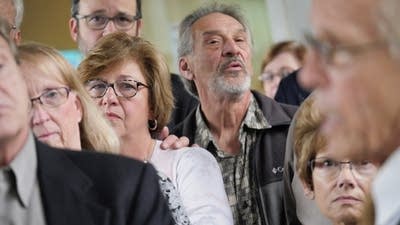Judge OKs $210M deal to pay Twin Cities clergy sex abuse victims

Go Deeper.
Create an account or log in to save stories.
Like this?
Thanks for liking this story! We have added it to a list of your favorite stories.
Updated: 5:32 p.m. | Posted: 12:27 p.m.
U.S. Bankruptcy Court Judge Robert Kressel said Tuesday he will confirm a bankruptcy reorganization plan for the Archdiocese of St. Paul and Minneapolis, bringing to a close a years-long process triggered by hundreds of allegations of clergy sexual abuse.
In a courtroom at the federal court in Minneapolis, Kressel told about 100 attorneys and abuse victims and their friends and families that he hopes everyone can learn from the process, especially in regard to protecting children.
Turn Up Your Support
MPR News helps you turn down the noise and build shared understanding. Turn up your support for this public resource and keep trusted journalism accessible to all.
Explore the full investigation Clergy abuse, cover-up and crisis in the Twin Cities Catholic church
After the hearing, victims' attorney Jeff Anderson said the plan is an affirmation of the power, will and diligence of abuse victims who wanted justice for themselves and safeguards to prevent the future abuse of children.
"It was the survivors that began to say, 'No more.' And it was the survivors that insisted that they come clean with all the files, all the offenders, all their identities, all their secrets," he said.

Last week, survivors of clergy sexual abuse voted 398 to 2 to endorse the plan, which provides $210 million for victims before attorneys' fees — typically a third — are deducted.
Abuse survivor David Lind of Cottage Grove said he feels a swirl of emotions, including relief, joy and sadness.
"The only regret, sadness is that it took so long to get here. Both decade-wise and within the bankruptcy process itself," Lind said.
Another abuse survivor, Bob Schwiderski, said he felt great relief.
"I feel like a World War II vet coming underneath the Golden Gate Bridge, coming home," he said. "Because we won the war. Our court system listened to survivors."
Schwiderski said that what matters most to him and other victims is not whatever money they get but the safeguards they have pushed the church to adopt to protect children from sexual abuse in the future.
The archdiocese filed for bankruptcy protection in January 2015. The process dragged on as the sides fought over how much the archdiocese could contribute from its assets and how much would be available from a multitude of insurance policies the church carried over the decades in which the abuse occurred.
In the end, most of the settlement money comes from insurance companies for the archdiocese and parishes. Parishes will contribute about $3 million of their own money.

The plan calls for the appointment of a person to review abuse victims' claims and assess how much compensation each survivor should get. Points will be assigned to victims based on the record of an abuser and the duration, frequency, circumstances of the abuse and other factors. It's hoped that survivors will be paid by year's end.
Archbishop Bernard Hebda said he hopes the resolution of the case will bring some measure of justice to the some 450 abuse victims who filed compensation claims against the archdiocese.
He said he knows money won't make up for "inexcusable failures that went on too long." He said he has been devastated to hear so many people say that they cannot believe in God because of how the church mishandled the abuse of children. But he said he hopes hearts can mend and trust can return.
"We've been speaking about restorative justice. We've had some pilot programs in 3 of our parishes. We have some more work that's going on in that area, trying to bring healing. We're reshaping our office for the protection of children and youth to really assist our parishes in being vehicles of outreach to those who have been hurt," he said.
Though most of the settlement comes from insurance proceeds, the archdiocese will be kicking in about $18 million from property sales and its own funds. Hebda says that means the church's budget will be tight in coming years.
"Really, already the archdiocese is operating with a very lean budget. We're going to have to continue that for a number of years," he said. "It's obviously going to be difficult. And that was one of the things that seemed to be important to the survivors with whom we spoke: that we would realize that we would feel some pain."





